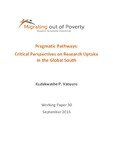| dc.description.abstract | One of social science’s core roles is to inform evidence-based policy making and policy interventions that produce pro-poor outcomes. This paper explores prominent debates on research uptake and policy making by scholars working on several relatively underexplored issues in the ‘Global South.’ Drawing parallels from previous studies and reflecting on working in research uptake activities surrounding domestic and international migration, this paper calls for more nuanced ways of thinking about policy change and impact in questioning normative assumptions underlying the ‘Theory of Change’ approach, as well as for greater awareness of national and sub-national political values, structures, and opportunities. It does this by drawing attention to four important variables. First, the nature of the policy issue, particularly how it is framed in public and political discourse. This bears on the issue’s popular appeal and, ultimately, the policy demand for research and the kind of policy changes that are possible. Second, institutional and political contexts that define and shape what issues are taken up on the policy agenda, who the key policy actors are and, how policy making processes are structured. Third, the issue of voice and audience: who is talking and who is being heard in any approach to research uptake and policy making. Lastly, it surfaces the semistochastic elements of timing: about how opportunity windows are sought, exploited and ideally if occasionally created, and the amount of time it takes to achieve change. It ultimately suggests that research translation demands a broad and non-linear approach to change that capitalises on back routes, solidarities and opportunism. Its conclusions are two-fold. First, that policy impact cannot be universally defined. Second, while the potential power of evidence to transform policy remains strong, we can assume neither that it will influence policy or that policy change will produce real, practical improvements for those about whom we are concerned. Indeed, the very nature of political and policy practice in the Global South questions the importance of laws and institutions as determinants of social outcomes. | |

